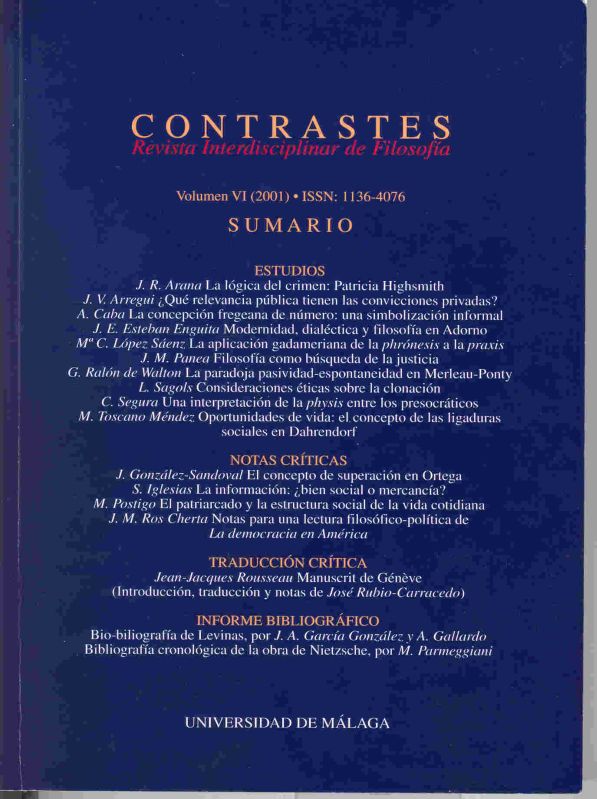La pardoja pasividad-espontaneidad en la filosofía de Merleau-Ponty
DOI:
https://doi.org/10.24310/Contrastescontrastes.v0i0.1626Keywords:
MERLEAU-PONTY, SER SENSIBLE, EXPRESIÓNAbstract
RESUMEN
El trabajo intentan mostrar en primer lugar que la pasividad no yace inerte en el fondo de nuestra conciencia, sino que es un fenómeno constituido, del que nuestra corporalidad y temporalidad dan testimonio. En un segundo momento, se analiza la paradoja de la consideración solidaria de las nociones de pasividad y actividad a la luz del "enigma de lo sensible", de un Ser "a distancia" que no puede ser considerado mediante las representaciones del pensamiento objetivo. Finalmente, se muestra cómo la noción de expresión revela que la paradoja se hace presente tanto en el nivel de nuestros comportamientos como en el nivel del lenguaje.
PALABRAS CLAVE
MERLEAU-PONTY-SER SENSIBLE-EXPRESIÓN
ABSTRACT
The article attempts to show that passivity does not lie inert in the depth of our consciosness but rather is a constitutive phenomenon to wich our corporality and temporality bear witness. Secondly, the paradox of the joint consideration of the notions os passivity and activity is examined in the light of the "enigma of the sensible", of a Being "at distance", which cannot of expression discloses that the paradox is present both in the level of our behavior and in the level of language.
KEYWORDS
MERLEAU-PONTY-SENSIBLE BEING-EXPRESSION
Downloads
Metrics
Publication Facts
Reviewer profiles N/A
Author statements
Indexed in
-
—
- Academic society
- N/A
- Publisher
- Universidad de Málaga
Downloads
Published
How to Cite
Issue
Section
License
This journal provides immediate free access to its content under the principle of making research freely available to the public. All content published in Contrastes. Revista Internacional de Filosofía, are subject to the Creative Commons Attribution-NonCommercial-ShareAlike 4.0 license whose full text can be found at <http://creativecommons.org/licenses/by-nc-sa/4.0>
It is the responsibility of the authors to obtain the necessary permissions of the images that are subject to copyright.
Authors whose contributions are accepted for publication in this journal will retain the non-exclusive right to use their contributions for academic, research and educational purposes, including self-archiving or repository in open access repositories of any kind.
The electronic edition of this magazine is edited by the Editorial Service of the University of Malaga (Uma Editorial), being necessary to cite the origin in any partial or total reproduction.










5.png)
